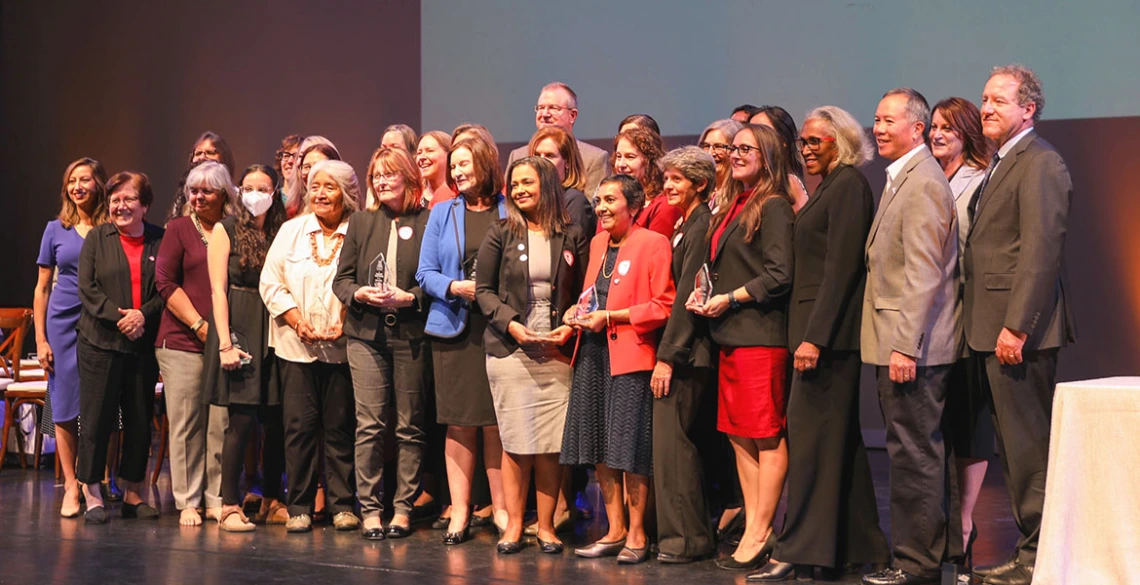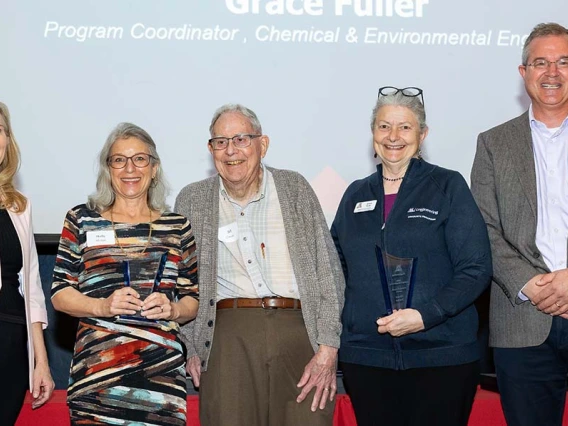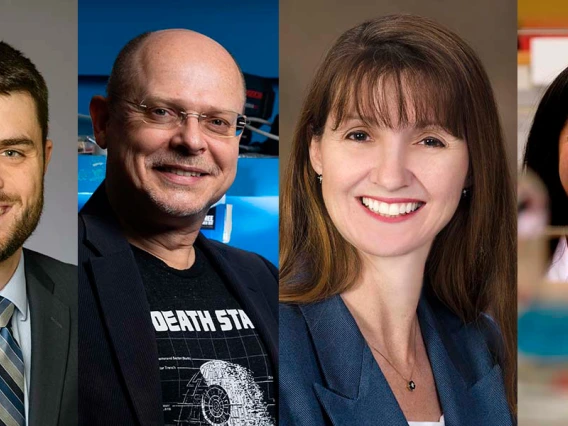Two Engineering Leaders Named Women of Impact
Liesl Folks and Kathleen Melde are lauded for their professional success and for creating inclusive STEM environments.

RII chooses 30 Women of Impact awardees each year who contribute significantly to the university community.
Kathleen Melde and Liesl Folks were honored in an Oct. 20 ceremony as 2023 Women of Impact. The Office of Research, Innovation and Impact gives the awards to 30 women at the University of Arizona to highlight faculty and staff who make significant contributions to the university’s efforts as a world-class research institution, and who empower colleagues and students to excel.
“I’m so proud that two Engineering faculty members are among the 30 awardees,” said David W. Hahn, Craig M. Berge Dean. “The College of Engineering is growing quickly – we continue to set records for both new faculty and enrollment. Liesl and Kathie are not only helping drive that growth, they’re providing examples for standards of excellence and inclusion within the college.”
Liesl Folks: A Force in Her Field
Folks is the vice president for semiconductor strategy and a professor of electrical and computer engineering. She is an internationally recognized authority on magnetic materials and devices research, as well as nanoscale metrology, and she holds a dozen U.S. patents for her inventions.
Hailing from Perth, Folks was the first woman to earn a doctorate degree in physics at the University of Western Australia in 20 years. The pioneering spirit runs in the family. Both of her parents were pilots, her mother being one of a very few women in a male-dominated field. Folks' background and experience have forged her determination to be a force for inclusion and equality in her field.
“In my studies and working career, I’ve often been the only woman in the room, and sometimes the environment was hostile,” she said. “At the same time, I had amazing support mentors. I want other women to feel that they are welcomed and belong, which is how I got interested in diversity and inclusion.”
Folks regularly mentors students one-on-one and is also looking to the university’s semiconductor initiatives to reach out to the broader community.
“We should not only build and expand the workforce to support the semiconductor industry, but that workforce should be as diverse as possible, and representative of the population in the United States,” she explained. “For us here at the University of Arizona, it means looking explicitly at how we can bring women to the table, and also traditionally underrepresented minorities in the STEM disciplines, especially as a Hispanic-serving institution.”
“Dr. Folks continues to support women in STEM fields and women in underrepresented populations at the University of Arizona,” said Nina Bates, director of operations and strategic initiatives in the Office of the Provost. “During her tenure as provost, she supported and funded University of Arizona Faculty Women of Color to participate in the Faculty of Women of Color in the Academy Conference. I had the opportunity to participate, and it was such amazing experience to be in the space with so many accomplished women of color.”
Kathleen Melde: More Than Welcoming
For Melde, the college’s associate dean of faculty affairs and a professor of electrical and computer engineering, the Women of Impact award is the second recognition of extraordinary service to the university community this year. In March, she was the first person to receive the Outstanding Supporter of Diversity & Inclusion award from the College of Engineering.
Melde is a leading expert in the field of small integrated antennas and the implementation of antennas in electronic devices. She has five U.S. patents, and her innovations have been incorporated into semiconductors technology, telecommunications and other sectors. Melde is also a Fellow of IEEE, the Institute of Electrical and Electronics Engineers, an honor bestowed on only one in a thousand IEEE members.
As the first female faculty member to serve in an associate dean position at the College of Engineering, Melde is uniquely positioned and attuned to expanding opportunity. She created a new faculty program that serves as 360-degree career resource initiative so that incoming faculty members can get their sea legs quickly and have the tools to advance their research and careers in academia.
“When we interview people, we want them to know that they can thrive here,” Melde said. “The Engineering Onboarding Program also helps create a sense of community among the faculty and builds a supportive professional cohort.”
Melde is finding the benefits work both ways. “Over time, we’re getting better hires and candidates as a result of the program,” she said. “They are better qualified, and they want to come here because they see we’re building a community.”
Melde has helped the college make great strides in its diversity goals, said Mark Van Dyke, the associate dean of research at the College of Engineering and professor of biomedical engineering.
“She has brought about a change in mindset that we cannot simply be welcoming; we must be proactive in our outreach and intentional in the development of an inclusive environment.”



